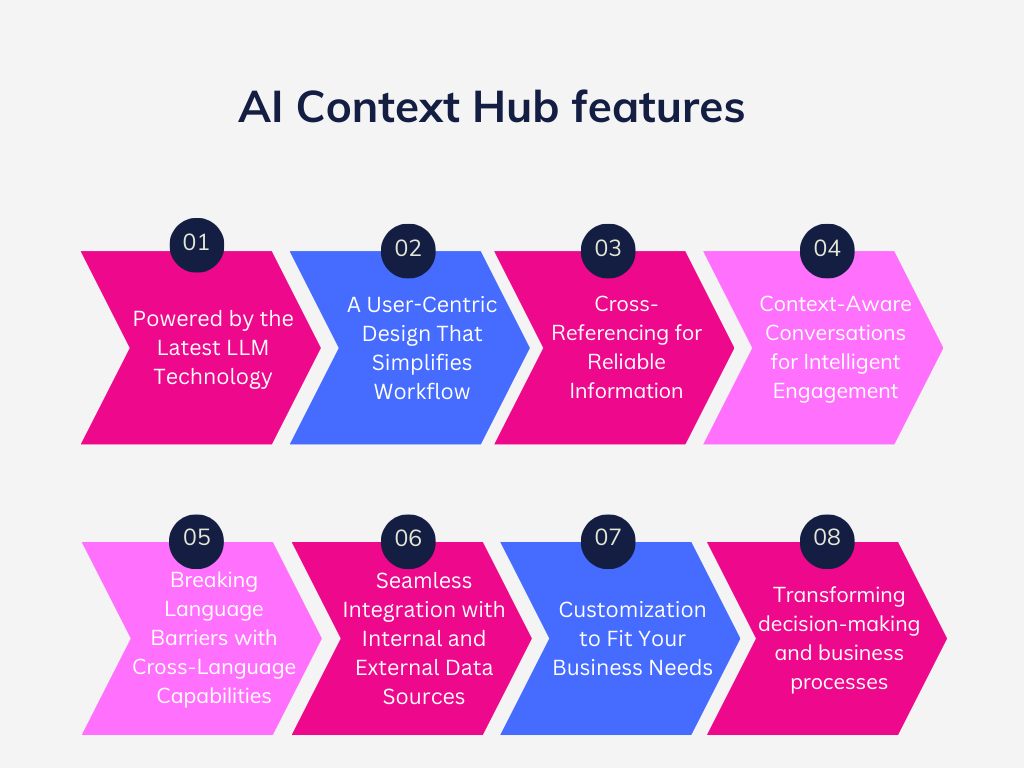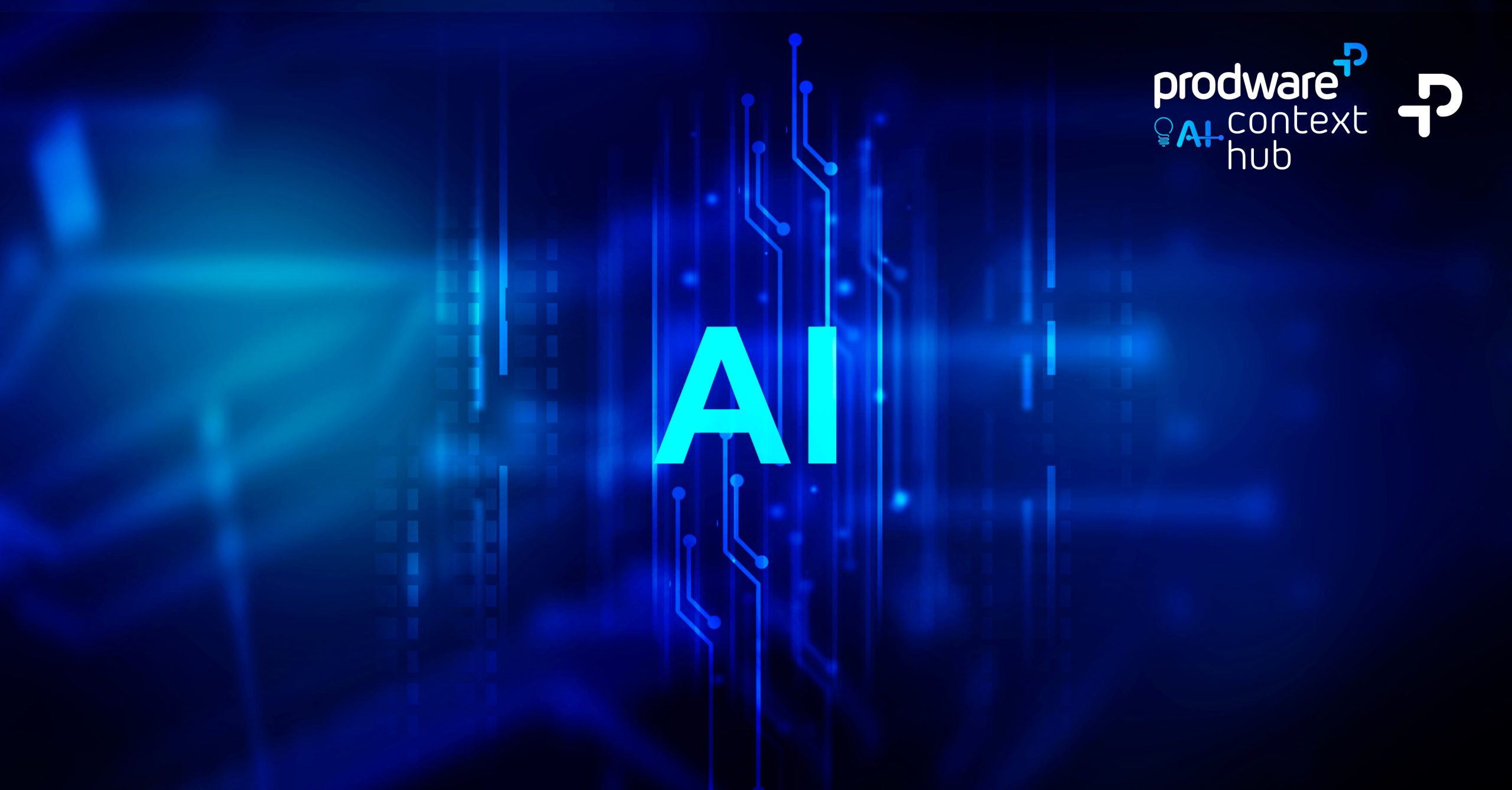Generative AI is becoming the norm in the business landscape, providing new ways to solve complex problems, automate repetitive and tedious tasks and enhance productivity. Generative AI uses advanced algorithms to create content, generate insights, and enable natural interactions with technology. However, as companies aim to tap into the immense potential of AI, they face the challenge of finding solutions that not only leverage advanced AI technologies but are also flexible, easy to use and aligned with genuine business requirements. This is exactly where AI Context Hub comes into play.
What are the real pain points related to manual processes and inefficient data access?
Turning to new technologies such as Artificial Intelligence is not done lightly by organizations. So let’s look at the main areas where a concrete financial impact is felt and what return-on-investment (ROI) can be considered by aligning common business pain points with the right choice of tech to overcome them.
Time spent searching
“Productivity drain” is a real issue. Research has highlighted significant productivity losses in businesses due to the time employees spend searching for information and documentation.
According to IDC Research over twenty years ago, workers were spending 2,5 hours a day searching for information. Is this challenge still relevant? In subsequent research, they discovered professionals are losing 50% of their time every week searching for, governing, and preparing data plus 20% duplicating work. McKinsey reports that employees spend 19% of their time searching for and gathering information.
And with flexible working with hybrid and remote employees collaborating together, this business challenge is impacted even more. According to Gartner, 47% of digital workers struggle to find the information needed to effectively perform their jobs.
Impact on decision-making
Decision-makers can often rely on assumptions rather than data-driven insights. This leads to inefficient processes, poor judgement calls, wasted resources and missed opportunities.
Forrester Research indicated that 60% of executives believe that poor data quality leads to bad decision-making, costing organizations an average of $15 million per year. This highlights how reliance on assumptions, often stemming from incomplete or inaccurate data, can lead to costly errors.
Gartner has published various reports and surveys highlighting challenges in data-driven decision-making and the importance of improving data quality and analytics. This struggle to make well informed decisions can lead to reliance on assumptions. As a result, strategies can misalign and resources can go to waste, further emphasizing the need for accurate data access. According to a McKinsey report, companies leveraging data and analytics effectively can gain significant insights and competitive advantages.
A study by Gartner found that poor data quality costs organizations an average of $15 million per year. This loss is attributed to inefficiencies in decision-making and productivity, as employees often struggle to find reliable data. Additionally, nearly 60% of organizations do not measure the costs associated with bad data, which can exacerbate the issue.
Forrester has indicated that low-quality data can significantly hinder productivity. They estimate that if businesses could improve data accessibility by just 10%, it could lead to an increase of over $65 million in net income for Fortune 1000 companies.
So, if employees (including management) can’t find the necessary or accurate information with a heavy reliance on guesswork it can lead to costly errors and inefficiencies.
Impact of manual processes
A study commissioned by Forrester found that only about one-third of tasks in IT functions are currently automated. This indicates that many organizations are still overwhelmed by manual tasks, leading to significant inefficiencies. Nearly 50% of large enterprises still perform key tasks manually, which can delay project timelines and increase operational costs.
Organizations that do not automate and leverage Generative AI could experience productivity losses of up to 30% when compared with the projected gains by those who do. Time spent on repetitive manual tasks, which could otherwise be streamlined through automation. The lack of automation can also lead to higher error rates, further compounding inefficiencies.
Businesses that fail to adopt automation technologies risk losing competitive advantage. Deloitte’s “Global Intelligent Automation Survey” highlights that companies that embrace automation can see productivity increases of 20-30% in various operational areas, such as customer service and data processing. In contrast, those relying on manual processes may struggle to keep up with market demands.
Organizations that automate their processes can achieve a 20% increase in productivity. McKinsey´s study suggests that automation not only speeds up processes but also reduces the likelihood of human error, which can be costly in manual operations.
Employee ability to handle change
The frustration of not being able to find information can negatively affect employee morale and job satisfaction. When employees struggle to locate necessary documentation, it can lead to stress and decreased engagement.
The cumulative effect of these inefficiencies can cost businesses millions annually.
McKinsey indicate that employee disengagement and attrition could cost a median-sized S&P 500 company between $228 million and $355 million annually in lost productivity.
These key impacts have financial impacts and underscore the importance of effective knowledge management processes and clear information retrieval practices to enhance decision-making, productivity and efficiency in the workplace.
Introducing AI Context Hub: The Smart Assistant built by Prodware
Developed by the talented team at Prodware, AI Context Hub stands out as a purpose-built platform that brings the power of generative AI (and other AI technologies) into the hands of your workforce. Combining the latest AI advancements, AI Context Hub empowers employees to seamlessly retrieve information from diverse trusted sources, both internal (like CRM systems, business applications, and documents) and external (such as websites and databases). Because we are close to our customer needs, our platform is designed with business context in mind, which make it a true partner rather than a simple chat assistant.
It’s like having a tool that actually listens, understands and delivers exactly what you need, when you need it, all while being intuitive and cost-effective. So, AI Context Hub isn’t just about providing answers; it’s about transforming the way teams interact with data and information.
AI Context Hub goes beyond being just an assistant or chat interface. It’s a powerful engine with multiple agents capable of handling tasks that require deep data understanding. Designed for versatility, it seamlessly facilitates end-to-end hyperautomation of processes.
And we’re not done! Because AI Context Hub is a dynamic platform that continues to evolve. Our experts are committed to actively incorporating the latest advancements and innovations to enhance its features, ensuring it addresses a wide evolving range of use cases.
What makes AI Context Hub special?

1. Powered by the Latest LLM Technology
AI Context Hub leverages Azure OpenAI models from the GPT family, renowned as the best in the market. Hosted on Microsoft Azure, a leading secure cloud platform, it combines state-of-the-art performance with security. So your data is protected while delivering top-tier AI capabilities.
This ensures users benefit from high-speed performance without compromising on cost-effectiveness. It also means the freedom to scale AI interactions without worrying about budget constraints or limitations on query volumes. It’s fast, reliable, and tailored to support your teams’ everyday needs.
2. A User-Centric Design That Simplifies Workflow
AI Context Hub boasts an intuitive UI and UX, making it easy for both everyday users and administrators to navigate. From the chat interface that facilitates natural language queries to the streamlined back office that supports admin oversight and user management, our team had simplicity and flexibility in mind when designing AI Context Hub.
3. Cross-Referencing for Reliable Information
AI Context Hub goes beyond delivering responses by integrating full cross-referencing. This feature allows users to trace back to the original source of the information provided, ensuring accuracy, supporting fact-checking and providing peace of mind. This feature is especially useful for teams handling research or client-facing documentation.
4. Context-Aware Conversations for Intelligent Engagement
What sets AI Context Hub apart from basic chatbots is its contextual awareness. The platform remembers prior interactions, adapting its responses based on follow-up questions and clarifications. Need to refine your search or get more details on a specific topic? AI Context Hub prompts users for more information when necessary, ensuring that conversations remain relevant and insightful.
5. Breaking Language Barriers with Cross-Language Capabilities
AI Context Hub offers comprehensive cross-language features that enable users to ask questions in one language and receive answers gathered from various languages. No matter if you’re dealing with documents in French, Spanish, or German etc., AI Context Hub ensures you get responses in the language of your choice, facilitating smooth international collaboration and global insight.
6. Seamless Integration with Internal and External Data Sources
The power of AI Context Hub extends beyond a simple search engine. It’s designed to pull together data from both internal systems (like CRMs and business applications) and external sources with no need for extensive setup or training. Using Azure AI Search as its backbone for indexing, AI Context Hub provides comprehensive responses that combine multiple data points into a cohesive answer.
While the tool is deployed on Azure, its flexibility allows it to connect seamlessly to data sources outside the Microsoft ecosystem, making it a truly adaptable solution for diverse organizational needs.
7. Customization to Fit Your Business Needs
AI Context Hub is built with flexibility in mind. The platform integrates smoothly with business and CRM systems and can be customized to align with specific workflows. For instance, in a support environment, agents using Dynamics 365 Customer Service can use AI Context Hub without leaving their application, which minimizes task-switching.
8. Transforming decision-making and business processes
AI Context Hub enables integration with leading technologies and data platforms like Power Automate, PowerApps, Microsoft Fabric and OneLake, streamlining manual processes that block productivity and surfacing data for more holistic insights.
AI Context Hub can function as an automation engine, capable of handling complex tasks that traditionally required human expertise. By applying the platform’s intelligence within end-to-end automation flows, you can achieve greater efficiency and scalability in your processes.
Multiple organizations like yours are leveraging AI Context Hub to support their business transformation, whether it’s an energy company clearing bottlenecks in invoicing processes or a pharmaceuticals business gaining more accuracy and productivity for their legal teams. The possibilities are endless.
Conclusion
To recap, AI Context Hub empowers users to make informed decisions faster and with greater confidence. By merging AI innovation with practical usability, Prodware’s AI Context Hub is more than just a tool—it’s a gateway to smarter work processes and enhanced productivity.
Ready to see AI Context Hub in action? Reach out today for a demo and experience firsthand how our tool can transform the way your teams interact with data and information.




